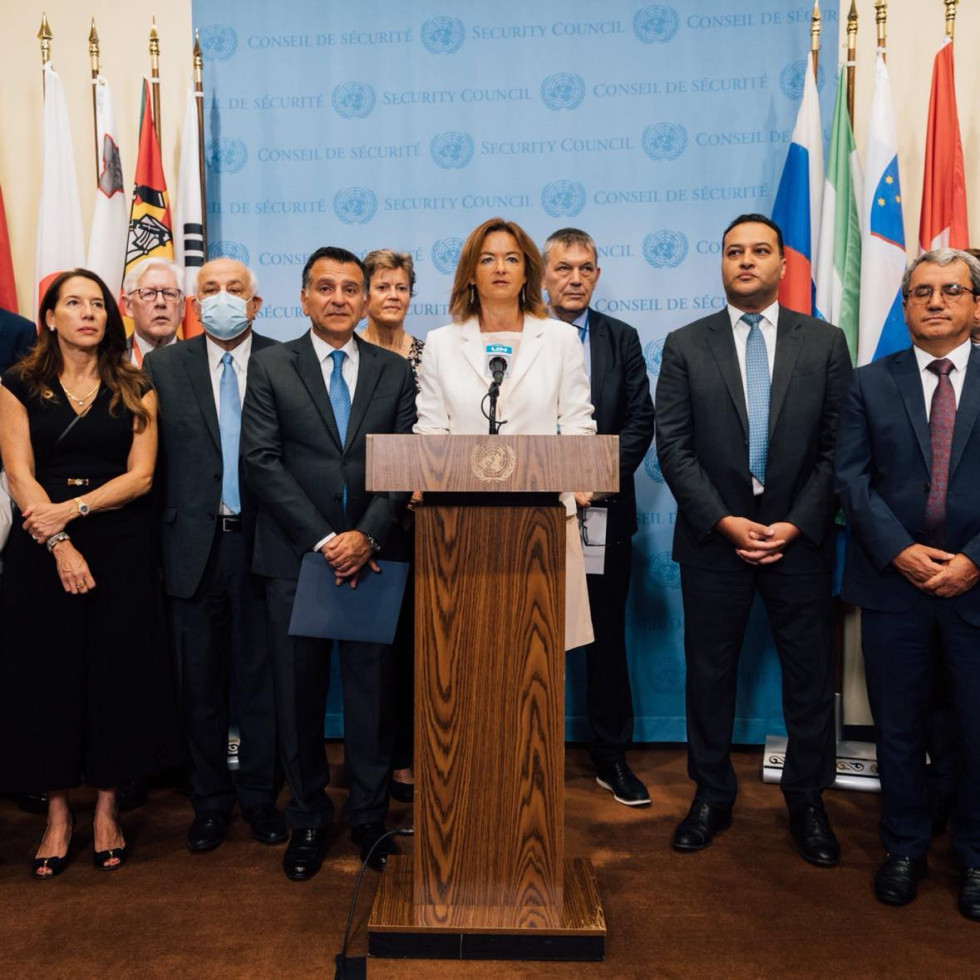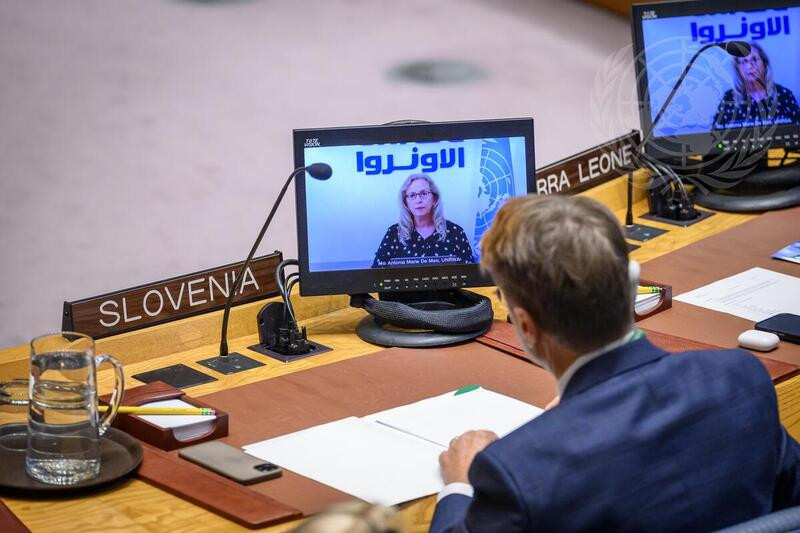Highlights of Slovenia’s activities in the UN Security Council in July 2024
The Security Council continues to focus on the situation in the Middle East. Earlier this month, the Senior Humanitarian and Reconstruction Coordinator for Gaza, Sigrid Kaag, reported on the functioning of the mechanism under UN Security Council resolution 2720, and on 26 July, the Security Council took note of the current humanitarian situation in Gaza.
Prior to the start of the regular UNRWA Pledging Conference on 12 July, Slovenia, Jordan and Qatar organised a media briefing on the shared commitments on UNRWA, presented by Minister Fajon and representatives of Jordan and Kuwait, in the presence of the UNRWA Commissioner-General and a number of UNRWA supporters. The initiative on shared commitments aims to send a strong signal of political support to UNRWA at a time when it is facing financial, political and operational challenges. The list of commitments provides guidance on how to engage with UNRWA. To date, more than 120 countries have signed up to the commitments, including all UN Security Council members and all newly elected members who will begin their mandates in 2025.
On 17 July, the Security Council held its quarterly open debate on the situation in the Middle East. The focus was on political messages - a two-state solution, recognition of Palestine and its membership of the UN, calls for an international peace conference. The broader regional dimension was also highlighted and repeated in the July Security Council debates on Syria, Yemen, Lebanon and the drone attack on Tel Aviv, claimed by Yemen-based Houthis, and the Israeli retaliatory strike on targets in the Hudaydah Port in Yemen.
Slovenia supported the convening of an emergency meeting on Ukraine on 9 July, proposed by the holders of the humanitarian dossier on Ukraine, France and Ecuador, following the attack on a children's hospital in Kyiv. Most Member States condemned the attack on the hospital, and several called for an end to the use of explosive weapons in densely populated areas. On 25 July, at the request of the Russian Federation, the Security Council again discussed arms supplies to Ukraine, with Slovenia reiterating the right of self-defence under Article 51 of the UN Charter and stressing that the arms supplies to the Russian side constitute violations of adopted Security Council resolutions.
On 8 July, Slovenia, with the support of Guyana, South Korea and Sierra Leone, hosted an informal Arria-formula meeting entitled "Stepping up Preventive Action: From Environmental Challenges to Opportunities for Peace". Chaired by Ambassador Samuel Žbogar, the meeting featured a panel of three moderators - Amy Pope, IOM Director General, Hanna Tetteh, Special Envoy of the UN Secretary-General for the Horn of Africa, and Nohora Alejandra Quiguantar, an indigenous youth leader and environmental human rights defender from Colombia.
The meeting brought together all members of the UN Security Council, the Group of Friends of Environmental Management (LEAF), the European Union, the International Committee of the Red Cross (ICRC), the Food and Agriculture Organization of the United Nations (FAO), INTERPOL and 23 other Member States from all regional groups. By convening this meeting, Slovenia addressed three key thematic priorities of its work in the UN Security Council - conflict prevention; climate; peace and security; and women, peace and security.
Additionally, Slovenia, in collaboration with the Colombian briefer, organised an informal meeting of Security Council members to discuss environmental challenges and peace in Colombia. This meeting served as a substantive follow-up to the Security Council debate on the situation in Colombia.
The Security Council also reviewed the situations in Haiti, Myanmar, the Democratic Republic of the Congo, Cyprus and West Africa. It noted the situation in Afghanistan following Doha3 and received a briefing from the Head of the UN Regional Centre for Preventive Diplomacy for Central Asia.
In July, the Security Council adopted four resolutions: extending the mandate of UN Mission to Support the Hudaydah Agreement in Yemen (UNMHA) for 12 months; extending the mandate of the UN Integrated Office in Haiti (BINUH) for one year; lifting the arms embargo on the Central African Republic (CAR) government forces while imposing an arms embargo on armed groups operating in the CAR; and extending the sanctions regime on the CAR for one year. Additionally, the Security Council enhanced the Focal Point mechanism within sanctions regimes by strengthening the role of the Focal Point for delisting and establishing a new, clearer procedure. This improvement will be supported by the collection of information on sanctioned individuals and the submission of a comprehensive report to the relevant Sanctions Committee.
In a press statement, the Security Council welcomed the planned talks on Sudan between the Sudanese Armed Forces (SAF) and the Rapid Support Forces (RSF) delegations in Geneva. The Council also expressed support for the efforts of Secretary-General’s Personal Envoy Lamamra, who briefed the Security Council on 29 July regarding the outcomes of the talks and the mediators' consultations in Djibouti and outlined the proposed way forward.
The Security Council also issued a press statement on Colombia, summarising the key points from the debate held earlier this month. In this statement, Security Council members expressed their full support for Colombia and urged continued, concerted action by Colombian institutions to expedite the full implementation of the Peace Agreement.



